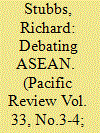| Srl | Item |
| 1 |
ID:
172129


|
|
|
|
|
| Summary/Abstract |
The contributions of Alice D. Ba, Mark Beeson, and Anja Jetschke and Patrick Theiner to the discussion about how to understand and explain ASEAN as a regional organization raise significant issues. Most importantly, their ideas extend our ability as scholars and commentators to productively debate and evaluate the institutional developments and policies of ASEAN and, indeed, all regional organizations.
|
|
|
|
|
|
|
|
|
|
|
|
|
|
|
|
| 2 |
ID:
124235


|
|
|
|
|
| Publication |
2013.
|
| Summary/Abstract |
A decade ago, in the autumn of 2003, a small group of soldiers criminally abused detainees at the Abu Ghraib prison in Iraq. Two divergent narratives explaining these events emerged: a "bad apple" narrative and a "bad barrel" narrative. Neither does justice to the complex interplay of policy, organizational, and individual factors that contributed to these tragic events. A perfect storm of poor leadership, chaotic and confusing policy changes, and a small group of corrupt and immoral soldiers produced this fiasco with global consequences
|
|
|
|
|
|
|
|
|
|
|
|
|
|
|
|
| 3 |
ID:
186873


|
|
|
|
|
| Summary/Abstract |
Understanding the reasoning behind diverse views grows empathy and can help strengthen democracy. This study examines narratives and their influence on individuals, to see if individuals only empathize with narratives from those with whom they share identity. Using an experimental design, we test empathy with working class climate change narratives. Results showed participants who agreed with anthropogenic climate change, who were given both evidence and a narrative, empathized with the narrator (either an organic farmer or a mechanic) that told a pro-climate change narrative. The greatest empathy was for the mechanic telling a pro-climate change narrative. Conversely, participants who did not agree with human-caused climate change and who were given evidence without narrative had more empathy for the organic farmer (over the mechanic) who told a pro-climate change narrative. Overall, we found some identity issues negatively influenced empathy, but we also found examples where individuals moved beyond their identity.
|
|
|
|
|
|
|
|
|
|
|
|
|
|
|
|